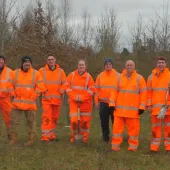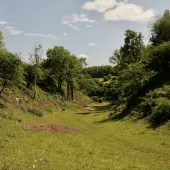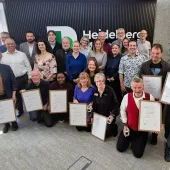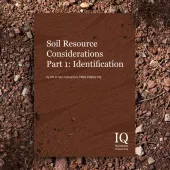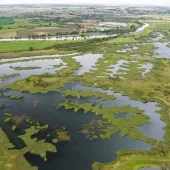Tarmac transfer Langford Lowfields to the RSPB
RSPB takes on ownership of wetland nature reserve created following historical land transfer
OWNERSHIP of a rare wetland habitat has been transferred to the RSPB in Nottinghamshire, giving some of the UK’s rarest species a unique home thanks to a historical land deal 25 years in the making.
Equal in size to 168 football pitches, the site is a haven for nature on the banks of the river Trent, where Tarmac, along with Trinity College Cambridge, have signed over 120ha of land to RSPB Langford Lowfields.
RSPB Langford Lowfields is a thriving wetland site, at the heart of which sits the largest reed bed in the East Midlands. The reserve is home to bittern, once nearly extinct in Britain, and other key species such as bearded tits, marsh harriers and otters.
Reed bed habitat has seen massive decline in the UK, predominantly due to land drainage.
In the late 1990s an agreement involving the RSPB and landowners Tarmac and Trinity College was signed which meant that quarried land would be passed over to the RSPB to manage for the benefit of wildlife and nature. Early February this year saw the fulfilment of the agreement.
Joe Harris, site manager at RSPB Langford Lowfields, said: ‘This is a vital and thriving wetland wonderland that provides a home for a range of amazing wildlife. This recent transfer of land to the RSPB marks a significant milestone in the history of the nature reserve and also in the ongoing, strong partnership between us and Tarmac.
‘This partnership has helped create a home for a diversity of wildlife with 215 species of bird being recorded on site and 53 species breeding here in 2022. Key reed bed species once on the brink of extinction in the UK now breed here, including the iconic bittern whose loud booming call can be heard throughout the Spring.
‘Looking ahead, as the woodlands, wetland, meadow and reed bed continue to develop and establish, so the variety of wildlife that people can see at Langford will continue to increase.’
Stuart Wykes, director of natural land and resources at Tarmac, said: ‘Handing over the ownership of Langford Lowfields to the RSPB has always been an integral part of our plan to restore and protect the land for years to come. It truly is a one-of-a-kind place and it’s important that it is preserved and cared for.
‘We have built an invaluable relationship with the RSPB over the years, and Langford Lowfields perfectly demonstrates how, through working together, conservation on a large scale can be very successful.
‘As part of our ongoing relationship, the RSPB works hard to look after the wetland habitat whilst we provide support with any restoration required. Restoring sites back to nature like this makes a positive impact on climate change and biodiversity loss.
‘We’re looking forward to continuing our relationship with the RSPB and seeing just how Langford Lowfields grows and evolves in the future.’




